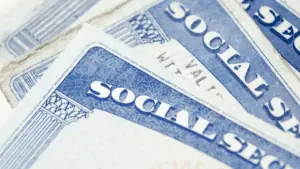Over the past 2+ years, we’ve seen markets like no other. Our “new normal” looks very different from what we’ve been accustomed to, given that we’ve just come out of the longest bull market in US history. This last bull market began in the depths of the financial crisis in 2009 and lasted roughly 11 years when the COVID-19 pandemic brought it to an end. Bad domestic policies, rising interest rates, high inflation, the war in Ukraine and a slowdown in China’s economy have caused many to rethink just how much they’re willing to pay for a wide range of stocks, from high-flying tech companies to traditional automakers₁. This in turn has many folks questioning if it might be time to reallocate their portfolio to cash to help ward off potential market losses.
I had this very conversation with some folks last week in my office, I’ll call then Mack and Susan. They’re a couple in their mid-sixties and want to retire in a year or so. Their concern about the overall stability of the markets is an understatement. They told Jen and I that they have been reading this column for years and are thankful for the education it provides. Mack told me that while they have done their own investing for years, after the past six month sell-off, they realize that they need to build a sound retirement system designed for a peace of mind retirement. They’ve been reading about the “rush to cash” that many in the media are promoting as a means to head off investment losses. They’re worried that all of their hard work saving and investing over the years could be washed away by a bear market or even a recession and wanted to understand their options.
We talked about how cash definitely has a place in a well-crafted portfolio. How much will depend on their unique circumstances, including their appetite for risk – especially how they’re able to handle volatile markets like we’re experiencing today. It’s not uncommon that when the stock market dives, many folks who employ an outdated buy and hold, hope for the best strategy realize that they do not have a sound retirement system, resulting in panic and an emotional move to cash to avoid losses. Hope is not at all a sound retirement system.
I explained to them that it appears high inflation and increasing interest rates are the new norm, and together they decrease the value of your dollar over time. For instance, if you need $100,000 today to make ends meet, you’ll actually need $181,000 in twenty years to purchase the same goods and services, assuming a standard inflation rate of 3%. In this case, a portfolio consisting entirely of cash loses value (purchasing power) over time₂.
In times of market turmoil, some folks may decide that pulling funds from riskier, growth-oriented assets and putting it all into cash can safeguard their money. But in doing so, they just may be surrendering potential opportunities for meaningful growth. And further detracting from your investment’s earning potential are today’s low interest rates for short-term investments. Sure, it’s a lot easier to leave that cash in the bank when it’s earning 3%, or 4% or 5%. Folks(we’re nowhere near these rates today, with most banks paying less than 1% on savings or money market accounts. That may be a system, but not a retirement system for their golden years.
While we recognize that cash reserves are an important part of a retiree or pre-retiree’s portfolio, pivoting all of your holdings to cash during a market downturn might be a mistake. Holding too much in cash could mean missing out on opportunities that could earn more over time.
Billionaire investor Warren Buffett has also said that, in reference to his company Berkshire Hathaway, while they “have endured similar cash-heavy positions from time to time in the past, these positions…are never permanent₄.”
And indeed, the average bear market has historically lasted for just 289 days, or about 10 months. Bull markets, on the other hand, can last for a few months to several years, but they tend to be longer than bear markets. The average bull market has historically lasted 973 days, or 2.7 years. They also tend to be more frequent: Bull markets have occurred for 78% of the past 91 years₅.
So, the big question becomes, just how much cash should you be holding? I said that with their current buy and hold strategy at a minimum, they should have enough cash to take advantage of those potential opportunities for growth, while maintaining sufficient cash reserves to handle any emergency. Many financial experts recommend keeping anywhere from three to twelve months of your expenses in cash to ensure your immediate needs can be met in the short-term. They both said to Jen and I, “What are our options?”
Folks, instead of relying purely on stock selection and asset allocation to limit risk, a more appropriate strategy leading up to and in your retirement years would be to implement a combination of modern tactical and strategic institutional strategies. These types of strategies employ quantitative data designed and deployed around a risk-first approach that helps to protect against the downside and help to succeed in all markets, including bull, bear, and neutral. This can be a good risk-managed approach toward investing, one that may just put you in the highest probability of financial success. Mack and Susan made the adjustment, should you?
And as always – be vigilant and stay alert, because you deserve more!
Have a great week.
Jeff Cutter offers investment advisory services through Cutter Financial Group, LLC, an SEC Registered Investment Advisor with offices in Falmouth, Duxbury, and Mansfield. Jeff can be reached at jeff@cutterfinancialgroup.com.
Insurance products, including annuities, are offered through Cutterinsure, Inc., (MA insurance license #2080572). Cutter Financial Group and Cutterinsure are affiliated and under common control but offer services separately. Members of Cutter Financial Group’s management receive revenue directly from Cutterinsure. Any compensation received is separate from and does not offset regular advisory fees. Cutter Financial Group does not charge advisory fees on any insurance products. We do not offer tax or legal advice. Always consult with qualified tax/legal professionals regarding your own situation. Investing in securities involves risk, including possible loss of principal. Insurance product guarantees are backed by the financial strength and claims-paying ability of the issuing company. This article is intended to provide general information. It is not intended to offer or deliver investment advice in any way. Market data and other cited or linked-to content in this article is based on generally available information and is believed to be reliable. Please contact us to request a free copy of Cutter Financials’ Form CRS, Form ADV 2A and applicable Form ADV 2Bs. 1. https://tinyurl.com/5b96fr6s 2. https://tinyurl.com/3pejwhbf 3. https://tinyurl.com/2p97xnfb 4. ibid. 5. https://tinyurl.com/4mnh5wpy








